Skip to comments.
The Church of the Word Incarnate
EWTN Library ^
| 1954
| Charles Cardinal Journet
Posted on 06/16/2004 8:33:58 PM PDT by gbcdoj
The Church of The Incarnate Word
Charles Cardinal Journet (b. 1891 d. 1975)
Selections From Chapter VIII, Excursus VIII: Election of a Pope
(5) Validity and certitude of election. The election, remarks John of St. Thomas, may be invalid when carried out by persons not qualified, or when, although effected by persons qualified, it suffers from defect of form or falls on an incapable subject, as for example one of unsound mind or unbaptized.
But the peaceful acceptance of the universal Church given to an elect as to a head to whom it submits is an act in which the Church engages herself and her fate. It is therefore an act in itself infallible and is immediately recognizable as such. (Consequently, and mediately, it will appear that all conditions prerequisite to the validity of the election have been fulfilled. )
Acceptance by the Church operates either negatively, when the election is not at once contested; or positively, when the election is first accepted by those present and then gradually by the rest (cf. John of St. Thomas, II-II, qq. 1-7; disp. 2, a. 2, nos. 1, 15, 28, 34, 40; pp. 228 et seq. ).
The Church has the right to elect the Pope, and therefore the right to certain knowledge as to who is elected. As long as any doubt remains and the tacit consent of the universal Church has not yet remedied the possible flaws in the election, there is no Pope, papa dubius, papa nullus. As a matter of fact, remarks John of St. Thomas, in so far as a peaceful and certain election is not apparent, the election is regarded as still going on. And since the Church has full control, not over a Pope certainly elected, but over the election itself, she can take all measures needed to bring it to a conclusion. The Church can therefore judge a Pope to be doubtful. Thus, says John of St. Thomas, the Council of Constance judged three Popes to be doubtful, of whom two were deposed, and the third renounced the pontificate (loc. cit., a. 3, nos. 10-11; vol. VII, p. 254).
To guard against all uncertainties that might affect the election the constitution Vacante Sede Apostolica counsels the elect not to refuse an office which the Lord will help him to fill (no. 86); and it stipulates that as soon as the election is canonically effected the Cardinal Dean shall ask, in the name of the whole College, the consent of the elect (no. 87). "This consent being given—if necessary, after a delay fixed by the prudence of the cardinals and by a majority of voices—the elect is at once the true Pope and possesses in act, and can exercise, the full and absolute jurisdiction over all the world" (no. 88).
(6) Sanctity of the election. These words do not mean that the election of the Pope is always effected with an infallible assistance since there are cases in which the election is invalid or doubtful, and remains therefore in suspense. Nor does it mean that the best man is necessarily chosen.
It means that if the election is validly effected (which, in itself, is always a benefit) even when resulting from intrigues and regrettable interventions (in which case what is sin remains sin before God) we are certain that the Holy Spirit who, overruling the Popes, watches in a special way over His Church, turning to account the bad things they do as well as the good, has not willed, or at least permitted, this election for any but spiritual ends, whose virtue will either be manifest, and sometimes with small delay, in the course of history, or will remain hidden till the revelation of the Last Day. But these are mysteries that faith alone can penetrate.
Selections From Chapter VIII, Excursus IX: Loss of the Pontificate
Many theologians hold that the assistance promised by Jesus to the successors of Peter will not only prevent them from publicly teaching heretical doctrine, but will also prevent them from falling into heresy in their private capacity. If that view is correct the question does not arise. St. Robert Bellarmine, in his De Romano Pontifice (lib. II, cap. xxx), already held this thesis as probable and easy to defend. It was however less widespread in his time than it is today. It has gained ground, largely on account of historical studies which have shown that what was once imputed to certain Popes, such as Vigilius, Liberius, Honorius, as a private heresy, was in fact nothing more than a lack of zeal and of courage in certain difficult moments, to proclaim and especially to define precisely, what the true doctrine was.
Others, such as Cajetan, and John of St. Thomas, whose analysis seems to me more penetrating, have considered that even after a manifest sin of heresy the Pope is not yet deposed, but should be deposed by the Church, papa haereticus non est depositus, sed deponendus. Nevertheless, they added, the Church is not on that account above the Pope. And to make this clear they fall back on an explanation of the same nature as those we have used in Excursus IV. They remark on the one hand that in divine law the Church is to be united to the Pope as the body is to the head; and on the other that, by divine law, he who shows himself a heretic is to be avoided after one or two admonitions (Tit. iii. 10). There is therefore an absolute contradiction between the fact of being Pope and the fact of persevering in heresy after one or two admonitions. The Church's action is simply declaratory, it makes it plain that an incorrigible sin of heresy exists; then the authoritative action of God disjoins the Papacy from a subject who, persisting in heresy after admonition, becomes in divine law, inapt to retain it any longer. In virtue therefore of Scripture the Church designates and God deposes. God acts with the Church, says John of St. Thomas, somewhat as a Pope would act who decided to attach indulgences to certain places of pilgrimage, but left it to a subordinate to designate which these places should be (II-II, q. I; disp. 2, a. 3, no. 29, vol. VII, p. 264). The explanation of Cajetan and John of St. Thomas—which, according to them, is also valid, properly applied, as an interpretation of the enactments of the Council of Constance—brings us back in its turn to the case of a subject who becomes in Divine law incapable at a given moment of retaining the papacy. It is also reducible to the loss of the pontificate by default of the subject. This then is the fundamental case and the others are merely variants. In a study in the Revue Thomiste (1900, p. 631, "Lettres de Savonarole aux princes chretiens pour la reunion d'un concile"), P. Hurtaud, O. P., has entered a powerful plea in the case—still open—of the Piagnoni. He makes reference to the explanation of Roman theologians prior to Cajetan, according to which a Pope who fell into heresy would be deposed ipso facto: the Council concerned would have only to put on record the fact of heresy and notify the Church that the Pope involved had forfeited his primacy. Savonarola, he says, regarded Alexander VI as having lost his faith. "The Lord, moved to anger by this intolerable corruption, has, for some time past, allowed the Church to be without a pastor. For I bear witness in the name of God that this Alexander VI is in no way Pope and cannot be. For quite apart from the execrable crime of simony, by which he got possession of the [papal] tiara through a sacrilegious bargaining, and by which every day he puts up to auction and knocks down to the highest bidder ecclesiastical benefices, and quite apart from his other vices—well-known to all—which I will pass over in silence, this I declare in the first place and affirm it with all certitude, that the man is not a Christian, he does not even believe any longer that there is a God; he goes beyond the final limits of infidelity and impiety" (Letter to the Emperor).[1019] Basing our argument on the doctrinal authorities which Cajetan was soon to invoke, we should say that Savonarola wished to collect together the Council, not because, like the Gallicans, he placed a Council above the Pope (the Letters to the Princes are legally and doctrinally unimpeachable), but so that the Council, before which he would prove his accusation, should declare the heresy of Alexander VI in his status as a private individual. P. Hurtaud concludes: "Savonarola's acts and words—and most of his words are acts—should be examined in detail. Each of his words should be carefully weighed and none of the circumstances of his actions should be lost sight of. For the friar is a master of doctrine; he does not only know it but he lives it too. In his conduct nothing is left to chance or the mood of the moment. He has a theological or legal principle as the motive power in each one of his decisions. He should not be judged by general laws, for his guides are principles of an exceptional order—though I do not mean by this that he placed himself above or outside the common law. The rules he invokes are admitted by the best Doctors of the Church; there is nothing exceptional in them save the circumstances which make them lawful, and condition their application."
1019 These were neither new nor isolated accusations. cf Schnitzer, Savonarola, Italian translation by E. Rutili, Milan 1931, vol. ii, p. 303.
(Excerpt) Read more at ewtn.com ...
TOPICS: Apologetics; Catholic; Theology
KEYWORDS: cardinaljournet; charlesjournet; infallibility; sedevacantism
Navigation: use the links below to view more comments.
first previous 1-20 ... 41-60, 61-80, 81-100, 101 next last
To: pro Athanasius
Now, here is the problem with saying that a Pope could not defect. This takes away his FREE WILL.No it doesn't: "Here is the problem with saying that a Pope could not teach error as pastor of the universal Church. This takes away his free will."
I think I have now discussed the point fully enough in opposition to those who vehemently oppose the grace of God, by which, however, the human will is not taken away, but changed from bad to good, and assisted when it is good. I think, too, that I have so discussed the subject, that it is not so much I myself as the inspired Scripture which has spoken to you, in the clearest testimonies of truth; and if this divine record be looked into carefully, it shows us that not only men's good wills, which God Himself converts from bad ones, and, when converted by Him, directs to good actions and to eternal life, but also those which follow the world are so entirely at the disposal of God, that He turns them whithersoever He wills, and whensoever He wills,--to bestow kindness on some, and to heap punishment on others, as He Himself judges right by a counsel most secret to Himself, indeed, but beyond all doubt most righteous. (St. Aurelius Augustin, Treatise on Grace and Free Will, 41)
when even the conciliar Popes themselves say the Orthodox are not excommunicated
They don't say that.
81
posted on
06/18/2004 7:21:19 AM PDT
by
gbcdoj
(For not the hearers of the law are just before God: but the doers of the law shall be justified.)
To: gbcdoj; 8mmMauser; AAABEST; Polycarp IV; NYer; Salvation; cpforlife.org; Land of the Irish; ...
Dear friend, It is difficult to read everything but what I said is the truth. I know its hard to believe that such a thing can happen but you see this is why the Conciliar Popes call the schismatics who do not believe in papal infaliblity or in papal primacy "sister Churches" well don't you think that they ought to leave their offering at the table and go and be reconciled to their brothers the traditional Catholic's who do believe in Papal infallibility and Papal primacy but have been scandalized as so many of us have been in the Mess we find ourselves in??
see http://www.catholicculture.org/docs/doc_view.cfm?recnum=3135 1 Paul VI and Athenagoras I, "Joint Declaration Penetres de Reconnaissance" (Dec. 7, 1965), 3: Acta Apostolicae Sedis 58 (1966), 20. The excommunications were mutually lifted in 1965: "Pope Paul VI and Patriarch Athenagoras I in his synod ... declare by mutual agreement ... to regret and to remove from memory and from the midst of the church the sentences of excommunication" (ibid., 4); cf. also Paul VI apostolic letter Ambulate in Dilectione (Dec. 12, 1965): AAS 58 (1966), 40-41; Athenagoras I, Patriarchal Tomos (Dec. 7, 1965): Tomos Agapes Vatican-Phanar (1958-1970), 129 (Vatican Polyglot Press: Rome-Istanbul, 1971), 290-294.
Also why would you think I don't believe in the grace of God? The quote you gave me has nothing to do St. Augustine's quote on grace and free will or a Pope falling from Grace and being excommunicated which one already has namely Honorius. Facts are facts. We have to stick to the facts. God bless you
82
posted on
06/18/2004 9:09:14 AM PDT
by
pro Athanasius
(Daniel 12:3 But they that are learned, shall shine as the brightness of the firmament: and they that)
To: pro Athanasius
The excommunications which were lifted were that of Cardinal Humbert by the Patriarch of Constantinople and of the Patriarch of Constantinople by Cardinal Humbert.
which one already has namely Honorius
Honorius wasn't a heretic.
83
posted on
06/18/2004 9:28:01 AM PDT
by
gbcdoj
(For not the hearers of the law are just before God: but the doers of the law shall be justified.)
To: gbcdoj
Here is my correction for my last mistakenly worded paragraph. "Also why would you think I don't believe in the grace of God? The St. Augustine quote you gave me on grace which I agree with has nothing to do with nor says anything about a Pope falling from Grace and being excommunicated which one already has namely Honorius. Facts are facts. Many Catholics who started off good went bad such a Lamannais which incidently the Vatican is also rehabilitating. Of cource we know that Lamennais promoted the papal infallibility doctrine of which later he recanted and he died outside the Church refusing a Catholic priest. He was a heretic but now the revolutionaries think he is a great guy due to their emphasis on social justice.
But I digress. We don't believe as Catholics once saved always saved. God respects our free will including a Pope's free will. Bellarmaine says it is possible for a validly elected Pope to defect just not probable and I agree with this great doctor of the Church. We have to stick to the facts. God bless you."
84
posted on
06/18/2004 9:40:25 AM PDT
by
pro Athanasius
(Daniel 12:3 But they that are learned, shall shine as the brightness of the firmament: and they that)
To: pro Athanasius
The St. Augustine quote you gave me on grace which I agree with has nothing to do with nor says anything about a Pope falling from Grace and being excommunicated which one already has namely Honorius.Augustin says that the wills of men "are so entirely at the disposal of God, that He turns them whithersoever He wills, and whensoever He wills". So if He wills that the Pope cannot become a pertinacious heretic, in view of His promise to St. Peter: "I have prayed for thee, that thy faith fail not" ...
Bellarmaine says it is possible for a validly elected Pope to defect just not probable and I agree with this great doctor of the Church
He says it can be held probably and piously that the Pope cannot defect. A probable opinion is a "theological opinion which is well founded either on the grounds of its intrinsic coherence or the extrinsic weight of authority favouring it."
85
posted on
06/18/2004 10:05:03 AM PDT
by
gbcdoj
(For not the hearers of the law are just before God: but the doers of the law shall be justified.)
To: gbcdoj
Ho hum, I tried......
 John Paul II Kissing the Koran
John Paul II Kissing the Koran
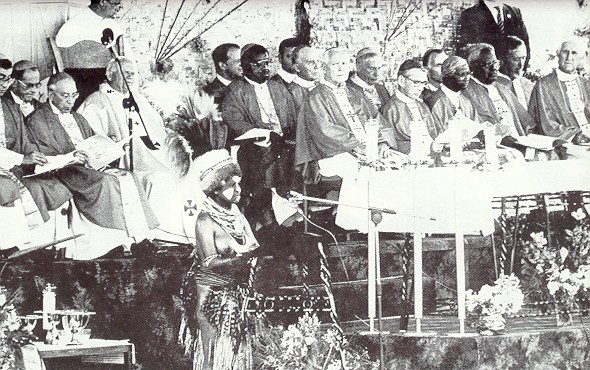 John Paul II at "Mass" in Papua, New Guinea (May 8, 1984) where the epistle is read by a bare-breasted woman.
John Paul II at "Mass" in Papua, New Guinea (May 8, 1984) where the epistle is read by a bare-breasted woman.
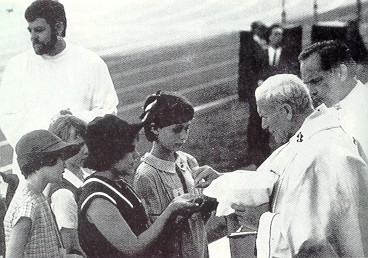 John Paul II giving "communion in the hand".
John Paul II giving "communion in the hand".
 John Paul II with the Trilateral Commission (Apr. 18, 1983).
John Paul II with the Trilateral Commission (Apr. 18, 1983).
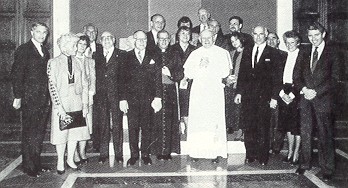 John Paul II with the B'nai B'rith (Mar. 22, 1984).
John Paul II with the B'nai B'rith (Mar. 22, 1984).
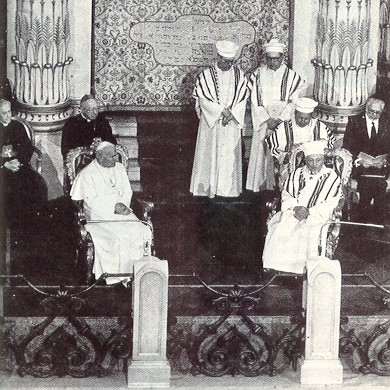 John Paul II at the Roman synagogue (Apr. 13, 1986).
John Paul II at the Roman synagogue (Apr. 13, 1986).
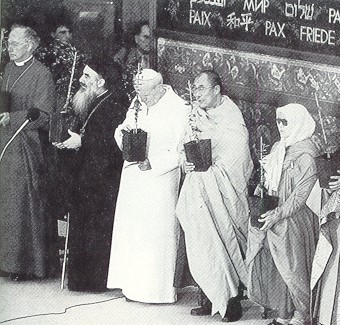 John Paul II with heretics, schismatics and pagans at Assisi (Oct. 27, 1986).
John Paul II with heretics, schismatics and pagans at Assisi (Oct. 27, 1986).
 Small statue of Buddha on an altar at Assisi.
Small statue of Buddha on an altar at Assisi.
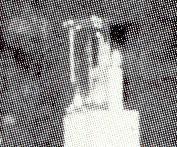 Zoom-in on tabernacle area of previous photo.
Zoom-in on tabernacle area of previous photo.
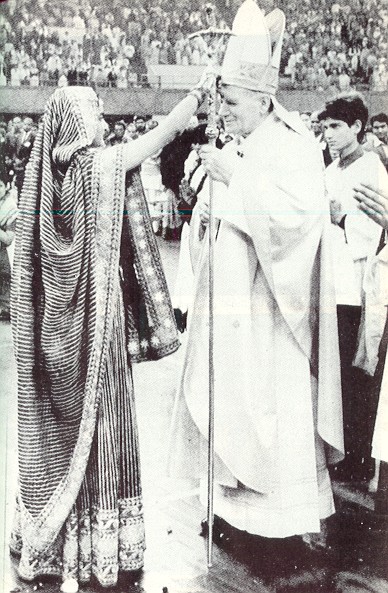 John Paul II being anointed with the pagan "Sign of the Tilak".
John Paul II being anointed with the pagan "Sign of the Tilak".
To: Land of the Irish; sinkspur
Yeah, they needed to loosen up and become entertainers: http://www.the-pope.com/jp2.html
To: Viva Christo Rey
Therefore, let them who in grave peril are ranged against the Church seriously bear in mind that after “Rome has spoken” they cannot be excused even by reasons of good faith. Certainly, their bond and duty of obedience toward the Church is much graver than that of those who as yet are related to the Church “only by an unconscious desire.” Let them realize that they are children of the Church, lovingly nourished by her with the milk of doctrine and the sacraments, and hence, having heard the clear voice of their Mother, they cannot be excused from culpable ignorance, and therefore to them applies without any restriction that principle: submission to the Catholic Church and to the Sovereign Pontiff is required as necessary for salvation.
88
posted on
06/18/2004 2:38:40 PM PDT
by
gbcdoj
(For not the hearers of the law are just before God: but the doers of the law shall be justified.)
To: Land of the Irish; sinkspur
Ok... let's try that again.
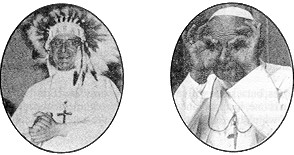
To: gbcdoj
Scandalous Photographs of Montini, aka 'Paul VI'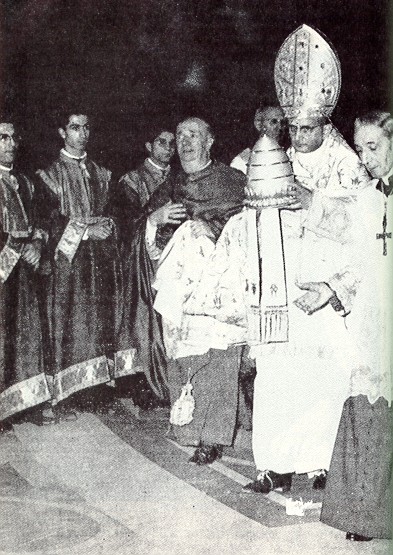
Paul VI gives up the papal tiara, the traditional symbol of the three-fold papal authority. None of his successors would consent to accept it.
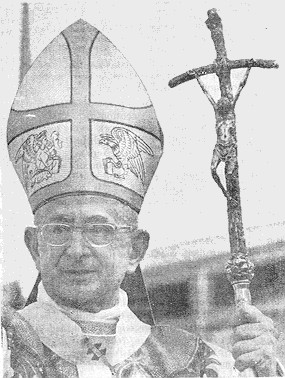
Paul VI with his grotesque "broken cross" which is an utter insult to Our Lord.
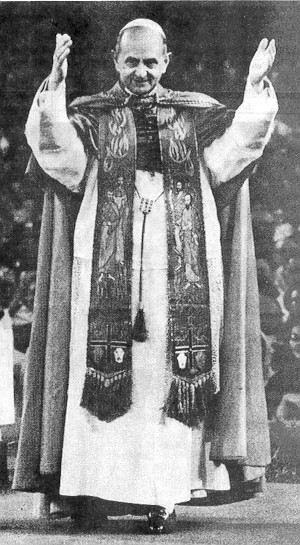
Paul VI wearing the Ephod of Caiphas, showing that he thinks more of Old Testament faith (Judaism) than Catholicism. No pope before him wore such an emblem.

Close-up of the Ephod in the previous photo. It contains 12 stones representative of the 12 tribes of Israel.
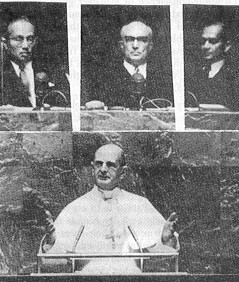
Paul VI addresses the United Nations on October 4, 1965, calling it (and not the Catholic religion) the "world's greatest hope".
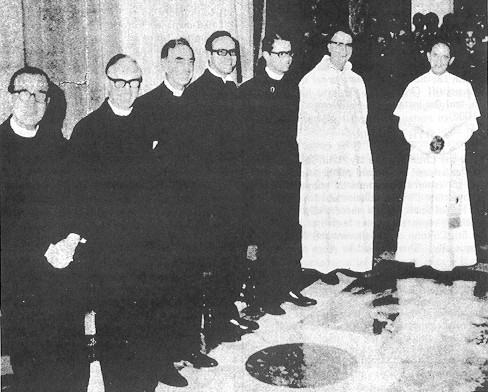
Paul VI with the Protestants who assisted in the formulation of the Novus Ordo Missae.
To: Viva Christo Rey
We ask: In the first place, whether you and the Church of the Armenians which is obedient to you, believe that all those who in baptism have received the same Catholic faith, and afterwards have withdrawn and will withdraw in the future from the communion of this same Roman Church, which one alone is Catholic, are schismatic and heretical, if they remain obstinately separated from the faith of this Roman Church. (Clement VI, DZ 570a)
It firmly believes, professes and preaches that all those who are outside the catholic church, not only pagans but also Jews or heretics and schismatics, cannot share in eternal life and will go into the everlasting fire which was prepared for the devil and his angels, unless they are joined to the catholic church before the end of their lives; (Council of Florence, DZ 714)
91
posted on
06/18/2004 3:26:18 PM PDT
by
gbcdoj
(For not the hearers of the law are just before God: but the doers of the law shall be justified.)
To: gbcdoj; 8mmMauser; AAABEST; Polycarp IV; NYer; Salvation; cpforlife.org; Land of the Irish; ...
Why can you not admit that you were incorrect?
I said “when even the conciliar Popes themselves say the Orthodox are not excommunicated’ (I should have added so they lifted the excommunication.)
You said “They don't say that.”
You say post 83 “The excommunications which were lifted were that of Cardinal Humbert by the Patriarch of Constantinople and of the Patriarch of Constantinople by Cardinal Humbert.”
Implying that it was only excommunications lifted for our by individuals. You are wrong and you ignore my citations from a “conservative” Catholic web site which clearly state that Paul VI and Patriarch Athenagoras lifted the very old communications which were done during the schism which occured hundreds of years ago in the middle ages.
You need to get your facts straight and admit you were incorrect if you are going to be credible with your posts. Why will you not admit that the excommunications were lifted? Facts are facts and you are leaving things out and misrepresenting them.
“As is well known, the divergences between Rome and Constantinople led in later centuries to mutual excommunications with "consequences which, as far as we can judge, went beyond what was intended and foreseen by their authors, whose censures concerned the persons mentioned and not the churches, and who did not intend to break the ecclesial communion between the sees of Rome and Constantinople."Paul VI and Athenagoras I, "Joint Declaration Penetres de Reconnaissance" (Dec. 7, 1965), 3: Acta Apostolicae Sedis 58 (1966), 20. The excommunications were mutually lifted in 1965: "Pope Paul VI and Patriarch Athenagoras I in his synod ... declare by mutual agreement ... to regret and to remove from memory and from the midst of the church the sentences of excommunication" (ibid., 4); cf. also Paul VI apostolic letter Ambulate in Dilectione (Dec. 12, 1965): AAS 58 (1966), 40-41; Athenagoras I, Patriarchal Tomos (Dec. 7, 1965): Tomos Agapes Vatican-Phanar (1958-1970), 129 (Vatican Polyglot Press: Rome-Istanbul, 1971), 290-294. This web site explains the new theory of “sister churches”on this site the admit that “The expression sister churches does not appear as such in the New Testament” See http://www.catholicculture.org/docs/doc_view.cfm?recnum=3135
I said “Now Honorius was excommunicated for allowing heresy to flourish but he was not declared a non Pope ahead of time by anyone that I know of.”
which one already has namely Honorius
You said, “Honorius wasn't a heretic.”
My full statement which you refused to put was “from Grace and being excommunicated which one already has namely Honorius.” It is obvious that Honorius fell from grace because as the head of the Church he did not stop rampant heresy and was excommunicated for it as I said in my earlier post# 79
You were trying to refute me like I claimed that Honorius wasn’t excommunicated for allowing heresy to be spread but was a heretic himself. You misrepresent my words.
Now you were willing to admit you were wrong about Origin not being excommunicated as I stated that he was for his heresy of no one in Hell at the end of time.
Moreover, I was correct in stating that Bellarmaine believed it was possible for a Pope to defect from the faith and loose his chair and I gave citations in my former posts and below.
Now you gave no citations ie. web sites and books for your statement, “He says it can be held probably and piously that the Pope cannot defect. A probable opinion is a "theological opinion which is well founded either on the grounds of its intrinsic coherence or the extrinsic weight of authority favoring it."
By the way Christ’s statements when he said to Peter, "I have prayed for thee, that thy faith fail not" ... Does not preclude the possibility that other Popes could not be excommunicated such as Honorius or be “manifest heretics as Bellarmine, Francis de Sales and Suerez posited. Now I do not adhere to this theory today but as I said if a living Pope excommunicated a Saint Pope like Pius X=- which I don’t think he would do or denied Christ’s divinity or said Contraception is a good thing and everyone should do it or abortion then its obvious he is a “manifest heretic.” So lets not make the seda vecantists look like they have fangs and horns just because they have applied Bellarmaine and other famous theologians and Doctors of the Church to today’s tragic situation of rampant heresy. As I accurately stated the excommunication was lifted on the Orthodox and I think its time for the Church of the Council as Paul VI called it to lift the excommunication on Lefebvre and the four Bishops of the SSPX. I think it is shear hypocrisy that Bishop Castro Mayer was not named in the so called excommunication when he was co- Consecrating the four SSPX Bishops as well and Mayer never signed ONE VATICAN II document because he rightly thought they were too ambiguous and prone to being interpreted in a liberal manner. Incidently the Mayer’s group in Campos never had to retract their statements about Vatican II or the New Mass or repudiate their so called previous schism or say Mayer was wrong in disobeying the Pope for co consecrating Bishops. It is time for us to stop being cruel to one another and love each other as did the apostles, correcting in charity but with firmness. The Pope is right to say that he was not strict enough. Honorius was not strict enough either, otherwise he would not have let heresy flourish. As I said, the situation is far worse than in Arius or Honorius time as Count Nero Capponi (a lawyer for the Roman rota) stated here http://www.ewtn.com/library/CANONLAW/CRIFAITH.HTM
The 1913 edition of The Catholic Encyclopedia: "The Pope himself, if notoriously guilty of heresy, would cease to be pope because he would cease to be a member of the Church." The common opinion of many theologians is that a Pope could become a manifest heretic and loose his seat. See http://www.newadvent.org/cathen/07256b.htm.
St. Robert Bellarmine taught: "The manifestly heretical pope ceases per se to be pope and head as he ceases per se to be a Christian and member of the Church, and therefore he can be judged and punished by the Church. This is the teaching of all the early Fathers." see Saint Robert Bellarmine, De Romano Pontifice (Milan, 1857), vol. II, chap. 30, p. 420.
see http://www.kensmen.com/catholic/bellarmine.html.
Saint Robert as I told you thought it was possible but not probable and he stated:
"This opinion (that the Pope could not become an heretic) is probable and easily defended . . . Nonetheless, in view of the fact that this is not certain, (he means that it is possible) and that the common opinion is the opposite one, it is useful to examine the solution to this question, within the hypothesis that the Pope can be an heretic." Saint Robert Bellarmine, De Romano Pontifice (Milan, 1857), vol. II, chap. 30 p. 418.
Bellarmine posited four theories then he stated in De Romano Pontifice this “Therefore, the true opinion is the fifth, according to which the Pope who is manifestly a heretic ceases by himself to be Pope and head, in the same way as he ceases to be a Christian and a member of the body of the Church; and for this reason he can be judged and punished by the Church. This is the opinion of all the ancient Fathers, who teach that manifest heretics immediately lose all jurisdiction, and outstandingly that of St. Cyprian (lib. 4, epist. 2) who speaks as follows of Novatian, who was Pope [antipope] in the schism which occurred during the pontificate of St. Cornelius: "He would not be able to retain the episcopate, and, if he was made bishop before, he separated himself from the body of those who were, like him, bishops, and from the unity of the Church."
92
posted on
06/18/2004 8:41:24 PM PDT
by
pro Athanasius
(Daniel 12:3 But they that are learned, shall shine as the brightness of the firmament: and they that)
To: Viva Christo Rey
Children like pictures.
You must be, like, 3.
93
posted on
06/18/2004 9:17:57 PM PDT
by
sinkspur
(There's no problem on the inside of a kid that the outside of a dog can't cure.)
To: pro Athanasius
No they weren't. Your own quote says "whose censures concerned the persons mentioned
and not the churches". The censures on the persons were lifted, but not the definitions of Lyons, Florence, and the First Vatican Council.
for his heresy of no one in Hell at the end of time
He denied teaching that, by the way.
Now you gave no citations ie. web sites and books for your statement,
Journet cites Bellarmine already in the OP.
It can be believed probably and piously that the supreme Pontiff is not only not able to err as Pontiff but that even as a particular person he is not able to be heretical, by pertinaciously believing something contrary to the faith.
shear hypocrisy that Bishop Castro Mayer was not named in the so called excommunication when he was co- Consecrating the four SSPX Bishops
He was named in the Decree of Excommunication issued by the Congregation for Bishops under His Eminence Cardinal Gantin.
94
posted on
06/18/2004 9:26:23 PM PDT
by
gbcdoj
(For not the hearers of the law are just before God: but the doers of the law shall be justified.)
To: pro Athanasius
about Bellarmine, I think we are both saying the same thing. He didn't think the Pope could become a heretic, but he admitted that he could be wrong and so treated of the matter assuming the falsity of his own belief.
95
posted on
06/18/2004 9:29:48 PM PDT
by
gbcdoj
(For not the hearers of the law are just before God: but the doers of the law shall be justified.)
To: gbcdoj
You still do not want to admit you are wrong.
"Pope Paul VI and Patriarch Athenagoras I in his synod ... declare by mutual agreement ... to regret and to remove from memory and from the midst of the church the sentences of excommunication" (ibid., 4); cf. also Paul VI apostolic letter Ambulate in Dilectione (Dec. 12, 1965): AAS 58 (1966), 40-41; Athenagoras I, Patriarchal Tomos (Dec. 7, 1965): Tomos Agapes Vatican-Phanar (1958-1970), 129 (Vatican Polyglot Press: Rome-Istanbul, 1971), 290-294. This web site explains the new theory of “sister churches”on this site the admit that “The expression sister churches does not appear as such in the New Testament” See http://www.catholicculture.org/docs/doc_view.cfm?recnum=3135
My quote merely shows that Cardinal Ratzinger demonstrates that his is an "interpretation" of the fact that the excommunication was between Rome and Constantinople and was "mutual" he said "As is well known, the divergences between Rome and Constantinople led in later centuries to mutual excommunications with "consequences which, as far as we can judge, went beyond what was intended and foreseen by their authors, whose censures concerned the persons mentioned and not the churches, and who did not intend to break the ecclesial communion between the sees of Rome and Constantinople." Now Ratzinger stated, "As far as we can judge-so he demonstrates that it is his own private judgement because the fact is that the mutual excommunication was not just between individuals representing the "ecclesial communities to use Vatican II newspeak but in fact involved the excommunication of the Orthodox Church itself after a period of time .
See for The Eastern Schism
http://www.newadvent.org/cathen/13535a.htm
"His points were different from those of Photius; he had forgotten the Filioque, and had discovered a new heresy in our use of azyme bread. But the actual accusations mattered little at any time, the idea that had been found so useful was that of declaring that we are impossible because we are heretics. It was offensive and it gave the schismatical leaders the chance of assuming a most effective pose, as defenders of the true Faith.
IV. AFTER CAERULARIUS
In a sense the schism was now complete. What had been from the beginning two portions of the same Church, what had become two entities ready to be divided, were now two rival Churches. Yet, just as there had been schisms before Photius, so there have been reunions after Caerularius. The Second Council of Lyons in 1274 and again the Council of Florence in 1439 both arrived at a reunion that people hoped would close the breach for ever. Unhappily, neither reunion lasted, neither had any solid basis on the Eastern side. The anti-Latin party, foreshadowed long ago, formed and organized by Photius, had under Caerularius become the whole "Orthodox" Church. This process had been a gradual one, but it was now complete. At first the Slav Churches (Russia, Servia, Bulgaria, etc.) saw no reason why they should break communion with the West because a patriarch of Constantinople was angry with a pope. But the habit of looking to the capital of the empire eventually affected them too. They used the Byzantine Rite, were Easterns; so they settled on the Eastern side. Caerularius had managed cleverly to represent his cause as that of the East; it seemed (most unjustifiably) that it was a question of Byzantines versus Latins.
At Lyons, and again at Florence, the reunion (on their side) was only a political expedient of the Government. The emperor wanted Latins to fight for him against the Turks. So he was prepared to concede anything — till the danger was over. It is clear that on these occasions the religious motive moved only the Western side. We had nothing to gain; we wanted nothing from them. The Latins had everything to offer, they were prepared to give their help. All they wanted in return was that an end should be made of the lamentable and scandalous spectacle of a divided Christendom. For the religious motive the Byzantines cared nothing; or rather, religion to them meant the continuation of the schism. They had called us heretics so often that they had begun to believe it. Reunion was an unpleasant and humiliating condition in order that a Frank army might come and protect them"
So we see the Catholic Encyclopedia clearly says they were two rival churches which demonstrate that it was not just as Ratzinger implied the censure of persons who authored the excommunication. It clearly spread to the Orthodox Bishops in general. If Ratzinger's statement was accurate that it applied only to the authors of the excommunication then the Church would have told people go ahead and go to an "orthodox Church" to fulfill your Sunday obligation but no that was forbidden before Vatican II because the excommunication was against the orthodox Church itself because as the Catholic encyclopedia states the other Orthodox Bishops went along with their Orthodox leaders and called us heretics. IF this excommunication just applied to a few dead Bishops then why say to Catholics the only reason you can receive sacraments from the orthodox is if you are in danger of death according to pre Vatican II teaching. (If my memory serves me correctly.)This is nonsense on Ratzinger's part as the problem of schism developed it involved the Churches as the Catholic encyclopedia demonstrates and not just individuals who authored the excommunications.
It doesn't matter after 100's of years what was initially intended, this is revisionist history, what matters is that there were two different Churches and the Orthodox were and are still in schism. The orthodox to this day do not admit to the primacy of Peter, the Filioque or papal infallibility or the Marian dogmas. Someday the Russians and other Orthodox will be united with Rome we have Mary's promise. Miracles do happen but it won't be because we compromise the truth.
What is your OP citation?
96
posted on
06/19/2004 12:13:28 AM PDT
by
pro Athanasius
(Daniel 12:3 But they that are learned, shall shine as the brightness of the firmament: and they that)
To: pro Athanasius
admit that “The expression sister churches does not appear as such in the New Testament”Neither does "ex cathedra", or a host of other theological terms.
The orthodox to this day do not admit to the primacy of Peter, the Filioque or papal infallibility or the Marian dogmas.
Yes and none of those were lifted - they carry an anathema for those who deny them. All that was lifted was the personal excommunications between Humbert and the Patriarch - an excommunication on Humbert's part which was invalid as the Pope was dead.
How can unity be restored after almost a thousand years? This is the great task which the Catholic Church must accomplish, a task equally incumbent on the Orthodox Church. Thus can be understood the continuing relevance of dialogue, guided by the light and strength of the Holy Spirit. (John Paul II, Ut Unum Sint §61)
97
posted on
06/19/2004 4:34:03 AM PDT
by
gbcdoj
(For not the hearers of the law are just before God: but the doers of the law shall be justified.)
To: gbcdoj; 8mmMauser; AAABEST; Polycarp IV; NYer; Salvation; cpforlife.org; Land of the Irish; ...
You claim the excommunication only applies to individuals this is hogwash by Cardinal Humbert and the Patriarch . This is not true- I showed you the quote that it was Paul VI and Athenagoras I,. You are very stubborn. There is no reason to lift an excommunication of a few dead people unless the people who followed them through the current situation would have the excommunication lifted also. You do not make sense and you are not looking at the facts. Now you know as well as I do that electricity isn't in the Gospels and neither is the Trinity. That is obvious but they are implied implicitly. You will not find Sister Churches or the new false ecumenism in revalation or tradition and it is not a TRUE Developement of Doctrine and it is killing off large sectors of the church and leading souls to HELL.
I am telling you that Ratziner has admitted this idea of Sister Churches is not in the New Testament and he has admitted that the statements on ecumenism in Vatican II documents are new as well and not found in the new testament Ratzinger said "The text on the Church was kept open primarily because it was to be supplemented by a text on ecumenism which would develop a viewpoint only hinted at in the Church text. Taking both texts into account, we can view in a positive light the undeniably admitted ecumenical outlook of the schema on the Church....The ecumenical movement grew out of a situation unknown to the New Testament and for which the New Testament can therefore offer no guidelines." "Theological Highlights of Vatican II", p. 68.
So they are doing the same thing with the Orthodox with the "sister Church" concept- its not in tradition or in any Church documents prior to Vatican II.
Now this is how Cardinal Ratzinger thinks of sticking with tradition:on the concept of tradition in Vatican II’s Dei Verbum, again Cardinal Ratzinger writes:
"Vatican II’s refusal of the proposal to adopt the text of Lerins, familiar to, and, as it were, sanctified by two Church Councils, shows once more how Trent and Vatican I were left behind, how their texts were continually reinterpreted....Vatican II had a new idea of how historical identity and continuity are to be brought about. The static semper of Vincent of Lerins no longer seems to Vatican II adequate to express the problem." (L.Th.K., Vol. 13, p. 521)
Gee I guess this great Saint wasn’t updated enough for Cardinal Ratzinger. Didn’t Lerins understand the convenient “myth” of “modern man” enough??
Contrast this with what St. Vincent of Lerins had to say about evolution which would create something new NOT based in Tradition or RevelationVs. the proper sense of progress in the same “kind”, sense and meaning : On the "Development" of the Christian Faith
Chapter XXIII. On Development in Religious Knowledge. See http://www.chattablogs.com/hagioipateres/archives/009181.html.
[54.] But some one will say. perhaps, Shall there, then, be no progress in Christ's Church? Certainly; all possible progress. For what being is there, so envious of men, so full of hatred to God, who would seek to forbid it? Yet on condition that it be real progress, not alteration of the faith. For progress requires that the subject be enlarged in itself, (he means that concept versus this next concept) alteration, that it be transformed into something else. The intelligence, then, the knowledge, the wisdom, as well of individuals as of all, as well of one man as of the whole Church, ought, in the course of ages and centuries, to increase and make much and vigorous progress; but yet only in its own kind; that is to say, in the same doctrine, in the same sense, and in the same meaning.
[55.] The growth of religion in the soul must be analogous to the growth of the body, which, though in process of years it is developed and attains its full size, yet remains still the same. There is a wide difference between the flower of youth and the maturity of age; yet they who were once young are still the same now that they have become old, insomuch that though the stature and outward form of the individual are changed, yet his nature is one and the same, his person is one and the same. An infant's limbs are small, a young man's large, yet the infant and the young man are the same. Men when full grown have the same number of joints that they had when children; and if there be any to which maturer age has given birth these were already present in embryo, so that nothing new is produced in them when old which was not already latent in them when children. This, then, is undoubtedly the true and legitimate rule of progress, this the established and most beautiful order of growth, that mature age ever develops in the man those parts and forms which the wisdom of the Creator had already framed beforehand in the infant. Whereas, if the human form were changed into some shape belonging to another kind, or at any rate, if the number of its limbs were increased or diminished, the result would be that the whole body would become either a wreck or a monster, or, at the least, would be impaired and enfeebled.
[56.] In like manner, it behoves Christian doctrine to follow the same laws of progress, so as to be consolidated by years, enlarged by time, refined by age, and yet, withal, to continue uncorrupt and unadulterate, complete and perfect in all the measurement of its parts, and, so to speak, in all its proper members and senses, admitting no change, no waste of its distinctive property, no variation in its limits.
[57.] For example: Our forefathers in the old time sowed wheat in the Church's field. It would be most unmeet and iniquitous if we, their descendants, instead of the genuine truth of corn, should reap the counterfeit error of tares. This rather should be the result,-there should be no discrepancy between the first and the last. From doctrine which was sown as wheat, we should reap, in the increase, doctrine of the same kind-wheat also; so that when in process of time any of the original seed is developed, and now flourishes under cultivation, no change may ensue in the character of the plant. There may supervene shape, form, variation in outward appearance, but the nature of each kind must remain the same. God forbid that those rose-beds of Catholic interpretation should be converted into thorns and thistles. God forbid that in that spiritual paradise from plants of cinnamon and balsam darnel and wolfsbane should of a sudden shoot forth.
Therefore, whatever has been sown by the fidelity of the Fathers in this husbandry of God's Church, the same ought to be cultivated and taken care of by the industry of their children, the same ought to flourish and ripen, the same ought to advance and go forward to perfection. For it is right that those ancient doctrines of heavenly philosophy should, as time goes on, be cared for, smoothed, polished; but not that they should be changed, not that they should be maimed, not that they should be mutilated. They may receive proof, illustration, definiteness; but they must retain withal their completeness, theirintegrity, their characteristic properties.
[58.] For if once this license of impious fraud be admitted, I dread to say in how great danger religion will be of being utterly destroyed and annihilated. For if any one part of Catholic truth be given up, another, and another, and another will thenceforward be given up as a matter of course, and the several individual portions having been rejected, what will follow in the end but the rejection of the whole? On the other hand, if what is new begins to be mingled with what is old, foreign with domestic, profane with sacred, the custom will of necessity creep on universally, till at last the Church will have nothing left untampered with, nothing unadulterated, nothing sound, nothing pure; but where formerly there was a sanctuary of chaste and undefiled truth, thenceforward there will be a brothel of impious and base errors. May God's mercy avert this wickedness from the minds of his servants; be it rather the frenzy of the ungodly.
[59.] But the Church of Christ, the careful and watchful guardian of the doctrines deposited in her charge, never changes anything in them, never diminishes, never adds, does not cut off what is necessary, does not add what is superfluous, does not lose her own, does not appropriate what is another's, but while dealing faithfully and judiciously with ancient doctrine, keeps this one object carefully in view,-if there be anything which antiquity has left shapeless and rudimentary, to fashion and polish it, if anything already reduced to shape and developed, to consolidate and strengthen it, if any already ratified and defined to keep and guard it. Finally, what other object have Councils ever aimed at in their decrees, than to provide that what was before believed in simplicity should in future be believed intelligently, that what was before preached coldly should in future be preached earnestly, that what was before practiced negligently should thenceforward be practiced with double solicitude? This, I say, is what the Catholic Church, roused by the novelties of heretics, has accomplished by the decrees of her Councils,-this, and nothing else,-she has thenceforward consigned to posterity in writing what she had received from those of olden times only by tradition, comprising a great amount of matter in a few words, and often, for the better understanding, designating an old article of the faith by the characteristic of a new name.
--The Commonitory, ch. XXIII
It is time to get back to the faith of our fathers not the indulgent love affair with “modern man”.
We are updating ourselves out of existence. It is time to get back to sound doctrine and teaching not the “New Theology” which pope Pius XII condmened.
Don't get into UT Unum Sint- "One must ask what oligarchs are going to do the decentralization and just how will Pope John Paul II's Ut Unum Sint be implemented when it calls for a "new way of exercising the papacy"? We need the authorities to use their God-given centralized ecclesiastical authority to crack down on the bad prelates who are homosexual pederasts and pedophiles, instead of attacking innocent priests like Fr. Nicholas Gruner and Fr. Haley in the Richmond Diocese who was put on trial by Bishop Thomas Doran (which Stephen Brady has posted at Roman Catholic Faithful) and The Society of St. Pius X Bishops and Priests, while men like Hans Kung and Richard McBrien have free reign to publish and spread their democratic ecclesiologies, and heresies."
98
posted on
06/19/2004 12:44:53 PM PDT
by
pro Athanasius
(Daniel 12:3 But they that are learned, shall shine as the brightness of the firmament: and they that)
To: pro Athanasius
There is no reason to lift an excommunication of a few dead peopleThere's no need to apologize for the actions of dead people either, but the Pope does it anyway.
99
posted on
06/19/2004 1:45:00 PM PDT
by
gbcdoj
(No one doubts ... that the holy and most blessed Peter ... lives in his successors, and judges.)
To: sinkspur
sinkspur wrote:
Children like pictures.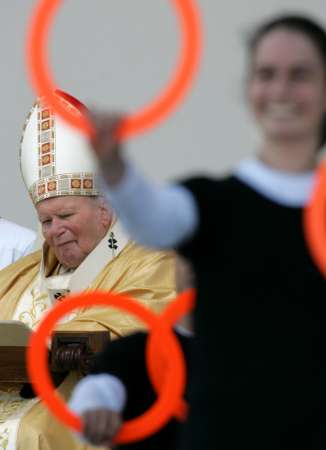
Navigation: use the links below to view more comments.
first previous 1-20 ... 41-60, 61-80, 81-100, 101 next last
Disclaimer:
Opinions posted on Free Republic are those of the individual
posters and do not necessarily represent the opinion of Free Republic or its
management. All materials posted herein are protected by copyright law and the
exemption for fair use of copyrighted works.
FreeRepublic.com is powered by software copyright 2000-2008 John Robinson
 John Paul II Kissing the Koran
John Paul II Kissing the Koran  John Paul II at "Mass" in Papua, New Guinea (May 8, 1984) where the epistle is read by a bare-breasted woman.
John Paul II at "Mass" in Papua, New Guinea (May 8, 1984) where the epistle is read by a bare-breasted woman.  John Paul II giving "communion in the hand".
John Paul II giving "communion in the hand".  John Paul II with the Trilateral Commission (Apr. 18, 1983).
John Paul II with the Trilateral Commission (Apr. 18, 1983).  John Paul II with the B'nai B'rith (Mar. 22, 1984).
John Paul II with the B'nai B'rith (Mar. 22, 1984).  John Paul II at the Roman synagogue (Apr. 13, 1986).
John Paul II at the Roman synagogue (Apr. 13, 1986).  John Paul II with heretics, schismatics and pagans at Assisi (Oct. 27, 1986).
John Paul II with heretics, schismatics and pagans at Assisi (Oct. 27, 1986).  Small statue of Buddha on an altar at Assisi.
Small statue of Buddha on an altar at Assisi.  Zoom-in on tabernacle area of previous photo.
Zoom-in on tabernacle area of previous photo.  John Paul II being anointed with the pagan "Sign of the Tilak".
John Paul II being anointed with the pagan "Sign of the Tilak".







